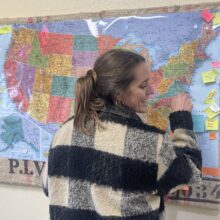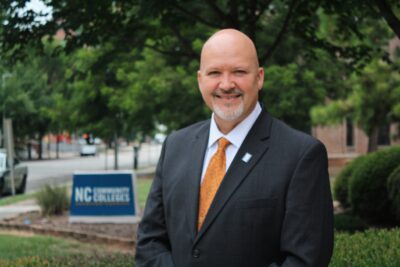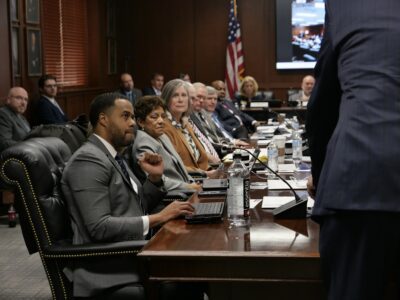

|
|
Six hundred and eighty rural advocates and leaders from 79 counties gathered March 20-21 in Raleigh for the NC Rural Center’s annual conference, which this year focused on the essential building blocks of rural community economic development: physical assets, business growth, social and civic vibrancy, talent development, and authentic leadership.
Patrick Woodie, president and CEO of the NC Rural Center, opened the summit by calling back to last year’s theme, the forces driving change. With those eight factors identified, he said, rural communities can move forward with knowledge, succeeding in spite of the challenges these changes create. The goal is to “build a stronger economy that works for everyone, and lifts all boats,” Woodie said.
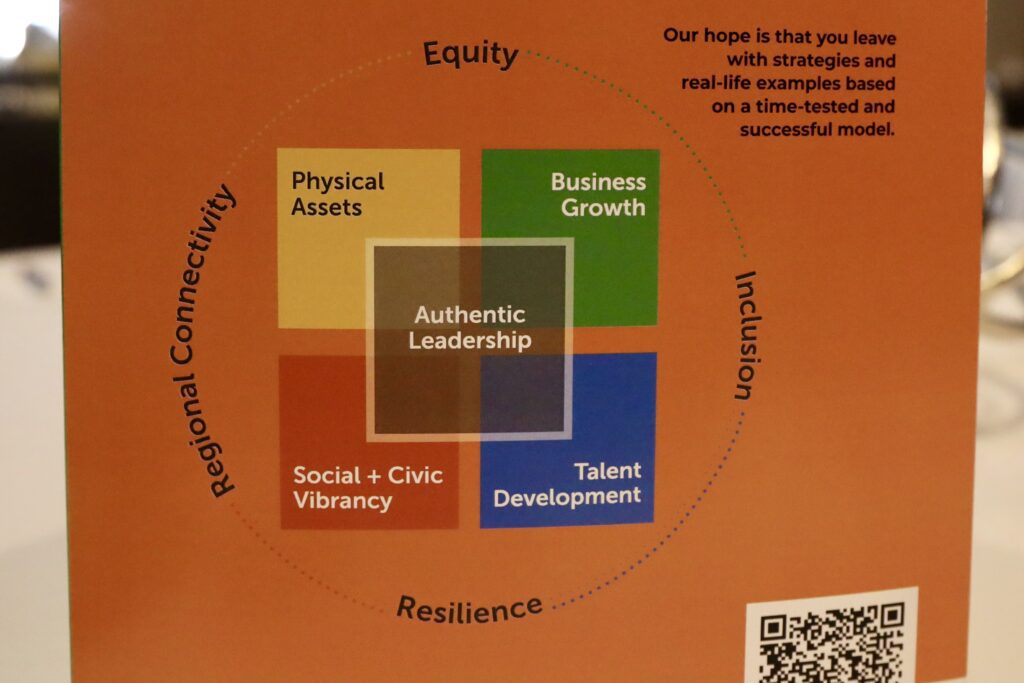

The first of the Summit’s plenary speakers, Tony Pipa, echoed Woodie’s message of looking back to move forward. Pipa, a senior fellow in the Center for Sustainable Development at the Brookings Institution, hosts the Reimagine Rural podcast, which spotlights rural towns and the people that are moving them toward positive change. In his exploration of rural America, he said that despite a national narrative, “Rural people are rural by choice … they see something (there) that fulfills them.”
Pipa said he learned by talking to people across the country that community identity is tied to heritage, and that we have to honor and reinforce that history. “You can’t take a place to its future without acknowledging its past,” he said.
‘Community colleges are the very solution’
The first day of the Rural Summit focused on changing the narrative of rural life, and breakout sessions highlighted big wins for communities and small businesses turning around their stories, relying on existing assets and new partnerships to find success. The second day, educational attainment took center stage.
There is no more important institution for our rural communities than community colleges. And I believe that with every fiber of my being.
Patrick Woodie, president and CEO of the NC Rural Center
Dr. Jeff Cox, president of the North Carolina Community College system, offered some statistics to ground the conversation. One in five children in North Carolina live below the federal poverty threshold, and children born into poverty are likely to stay there. “Poverty is stubborn,” Cox said.
Right now in North Carolina 60% of jobs require an education beyond high school, and only 41% of adults living in rural counties have a postsecondary credential.
Those two things aside, Cox said, our state’s economy is booming. “We’ve tens of thousands of new jobs coming with projects totaling $12.9 billion of capital investment in 2023,” he said. And yet, with new jobs expected, three out of four employers say they struggle to fill their workforce. Cox knows the answer to these big challenges facing North Carolina.
“Folks, I think our community colleges are the very solution for both things. People in poverty are looking for a way out. Businesses and industries need a talent pipeline that will help them secure their future. Our community colleges are at the heart of that solution.”
Dr. Jeff Cox, president of the North Carolina Community College System
Cox continued: “We need to resource our communities in a way that will help us evolve to meet the needs of the new North Carolina economy,” and he introduced to the audience the new funding model, Propel NC, proposed to the legislature for this year’s short session.
A panel followed Cox with four community college presidents from different regions. Dr. Pamela Senegal of Piedmont Community College, Dr. Jack Bagwell of College of The Albemarle, Dr. Shelley White of Haywood Community College and Dr. John Enamait of Stanly Community College shared their schools’ differing challenges and regional gifts.
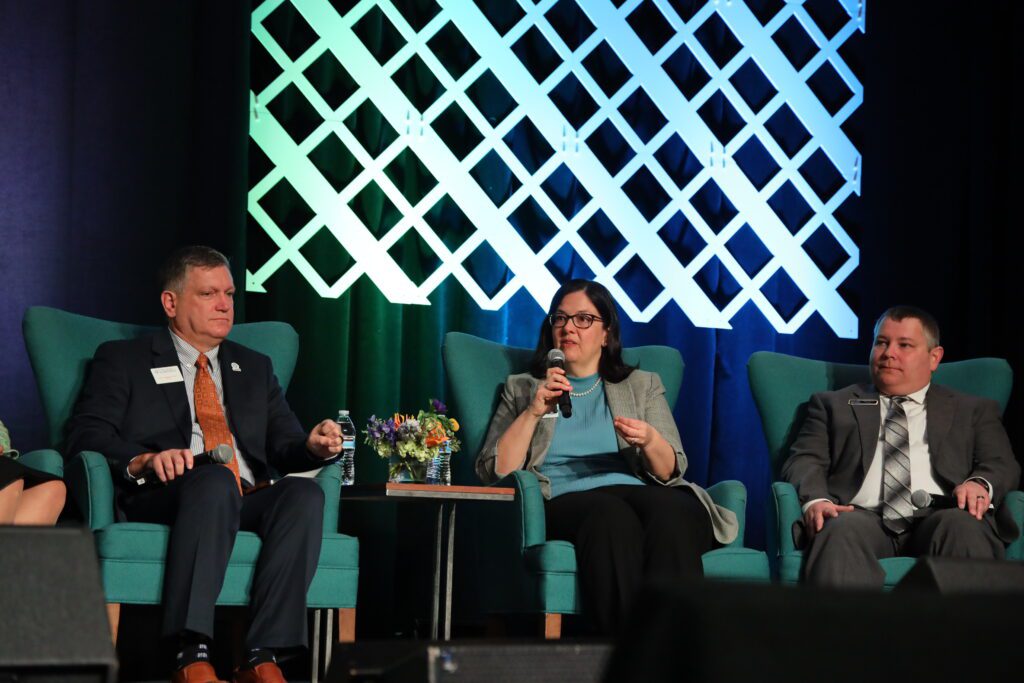

Bagwell talked of his school’s service area being larger than the state of Delaware, and White of her community losing 1,100 jobs with the closing of the Pactiv Evergreen paper mill.
Senegal spoke of the limited resources in her region, and of being in “lockstep” with the public school system so they aren’t competing for those assets. Enamait talked about the housing challenges Stanly faces with population growth.
The panel reaffirmed that no matter the region, from the Blue Ridge Mountains to the Piedmont to the Coastal Plain, rural colleges also share the same challenges. It is the nimbleness and resiliency of these educational institutions and their leaders that creates opportunity no matter how the obstacles manifest.
Breakout sessions for the second day tackled healthcare, housing, job creation, talent development, farming, educational attainment and more.
MyFutureNC’s Cecilia Holden spoke at the “Future of Work and Rural Talent Development” panel, pointing out that the state is behind on its projected goal of 2 million North Carolinians ages 25-44 holding an industry-valued credential or postsecondary degree by 2030.
“If you don’t have skilled workforce,” she said, “you can lose the businesses you do have and you can’t bring in good businesses.” Over the past three years, North Carolina has increased educational attainment by 4%, but it is still tracking behind. If the numbers continue as they are, North Carolina is projected to fall short by 71,000 individuals with degrees and credentials to fill available jobs by the year 2030.
There’s one word that describes economic development. What is that? Education. Education and economic development are one and the same.
Cecilia Holden, CEO & President at MyFutureNC
Woodie said at the beginning of the Rural Summit that he hoped attendees would leave with strategies, real-life examples, and new contacts that are tied to success around the building blocks, a time-tested model.
Below are resources from the annual gathering.
Rural Summit resources
- Rural RISE NC — An initiative connecting North Carolinians with mentors, business counselors, and funding sources within communities.
- Thread Capital – A mission to provide capital, coaching, and connections to small businesses who have traditionally had challenges accessing resources. The specific focus is on small businesses that are owned by people of color, women, low-income individuals, and rural-based individuals.
- Institute for Emerging Issues (IEI) BAND-NC – IEI’s resources can provide technical assistance, training, and mini-grants to communities across the state to develop and implement digital inclusion plans.
- Partners for Impact – The nationwide affordable housing crisis is affecting rural communities in North Carolina in unique ways. Partners for Impact recently released a white paper, Insights into Rural Affordable Housing Development, after conducting outreach across 39 rural counties in central and eastern North Carolina.
- Mountain West NC Partnership – This is an economic development partnership for seven far western counties. This resource directory is an intuitive tool designed to connect people with key resources that can help them start or grow a business.
- County Attainment profiles – From MyFutureNC, this resource can help people find their county’s attainment profile. These educational attainment levels and key metrics can assist in the decision-making process regarding local priorities to increase educational attainment at the local level.
- North Carolina County Health Data map – Discover the health and well-being of North Carolina’s counties using this interactive map providing health data by county, as well as county health profiles for each county. Data include demographics, population, employment, income, health insurance, health care workforce, health care utilization, health status and more.
